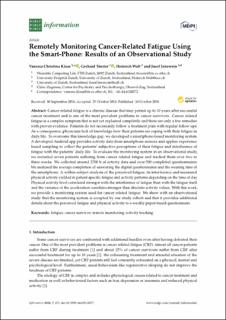Please use this identifier to cite or link to this item:
https://doi.org/10.21256/zhaw-20592Full metadata record
| DC Field | Value | Language |
|---|---|---|
| dc.contributor.author | Klaas, Vanessa Christina | - |
| dc.contributor.author | Tröster, Gerhard | - |
| dc.contributor.author | Walt, Heinrich | - |
| dc.contributor.author | Jenewein, Josef | - |
| dc.date.accessioned | 2020-10-14T11:42:35Z | - |
| dc.date.available | 2020-10-14T11:42:35Z | - |
| dc.date.issued | 2018-10-30 | - |
| dc.identifier.issn | 2078-2489 | de_CH |
| dc.identifier.uri | https://digitalcollection.zhaw.ch/handle/11475/20592 | - |
| dc.description.abstract | Cancer related fatigue is a chronic disease that may persist up to 10 years after successful cancer treatment and is one of the most prevalent problems in cancer survivors. Cancer related fatigue is a complex symptom that is not yet explained completely and there are only a few remedies with proven evidence. Patients do not necessarily follow a treatment plan with regular follow ups. As a consequence, physicians lack of knowledge how their patients are coping with their fatigue in daily life. To overcome this knowledge gap, we developed a smartphone-based monitoring system. A developed Android app provides activity data from smartphone sensors and applies experience based sampling to collect the patients’ subjective perceptions of their fatigue and interference of fatigue with the patients’ daily life. To evaluate the monitoring system in an observational study, we recruited seven patients suffering from cancer related fatigue and tracked them over two to three weeks. We collected around 2700 h of activity data and over 500 completed questionnaires. We analysed the average completion of answering the digital questionnaires and the wearing time of the smartphone. A within-subject analysis of the perceived fatigue, its interference and measured physical activity yielded in patient specific fatigue and activity patterns depending on the time of day. Physical activity level correlated stronger with the interference of fatigue than with the fatigue itself and the variance of the acceleration correlates stronger than absolute activity values. With this work, we provide a monitoring system used for cancer related fatigue. We show with an observational study that the monitoring system is accepted by our study cohort and that it provides additional details about the perceived fatigue and physical activity to a weekly paper-based questionnaire. | de_CH |
| dc.language.iso | en | de_CH |
| dc.publisher | MDPI | de_CH |
| dc.relation.ispartof | Information | de_CH |
| dc.rights | http://creativecommons.org/licenses/by/4.0/ | de_CH |
| dc.subject | Mobile health | de_CH |
| dc.subject | Activity monitoring | de_CH |
| dc.subject | Cancer-related fatigue | de_CH |
| dc.subject.ddc | 004: Informatik | de_CH |
| dc.subject.ddc | 616: Innere Medizin und Krankheiten | de_CH |
| dc.title | Remotely monitoring cancer-related fatigue using the smart-phone : results of an observational study | de_CH |
| dc.type | Beitrag in wissenschaftlicher Zeitschrift | de_CH |
| dcterms.type | Text | de_CH |
| zhaw.departement | Rektorat und Ressorts | de_CH |
| zhaw.organisationalunit | Ressort Forschung & Entwicklung | de_CH |
| dc.identifier.doi | 10.3390/info9110271 | de_CH |
| dc.identifier.doi | 10.21256/zhaw-20592 | - |
| zhaw.funding.eu | No | de_CH |
| zhaw.issue | 11 | de_CH |
| zhaw.originated.zhaw | No | de_CH |
| zhaw.pages.start | 271 | de_CH |
| zhaw.publication.status | publishedVersion | de_CH |
| zhaw.volume | 9 | de_CH |
| zhaw.publication.review | Peer review (Publikation) | de_CH |
| zhaw.author.additional | No | de_CH |
| zhaw.display.portrait | Yes | de_CH |
| Appears in collections: | Publikationen Rektorat und Ressorts | |
Files in This Item:
| File | Description | Size | Format | |
|---|---|---|---|---|
| 2018_Klaas_etal_Remotely-monitoring-cancer-related-fatigue_Information.pdf | 2.69 MB | Adobe PDF |  View/Open |
Show simple item record
Klaas, V. C., Tröster, G., Walt, H., & Jenewein, J. (2018). Remotely monitoring cancer-related fatigue using the smart-phone : results of an observational study. Information, 9(11), 271. https://doi.org/10.3390/info9110271
Klaas, V.C. et al. (2018) ‘Remotely monitoring cancer-related fatigue using the smart-phone : results of an observational study’, Information, 9(11), p. 271. Available at: https://doi.org/10.3390/info9110271.
V. C. Klaas, G. Tröster, H. Walt, and J. Jenewein, “Remotely monitoring cancer-related fatigue using the smart-phone : results of an observational study,” Information, vol. 9, no. 11, p. 271, Oct. 2018, doi: 10.3390/info9110271.
KLAAS, Vanessa Christina, Gerhard TRÖSTER, Heinrich WALT und Josef JENEWEIN, 2018. Remotely monitoring cancer-related fatigue using the smart-phone : results of an observational study. Information. 30 Oktober 2018. Bd. 9, Nr. 11, S. 271. DOI 10.3390/info9110271
Klaas, Vanessa Christina, Gerhard Tröster, Heinrich Walt, and Josef Jenewein. 2018. “Remotely Monitoring Cancer-Related Fatigue Using the Smart-Phone : Results of an Observational Study.” Information 9 (11): 271. https://doi.org/10.3390/info9110271.
Klaas, Vanessa Christina, et al. “Remotely Monitoring Cancer-Related Fatigue Using the Smart-Phone : Results of an Observational Study.” Information, vol. 9, no. 11, Oct. 2018, p. 271, https://doi.org/10.3390/info9110271.
Items in DSpace are protected by copyright, with all rights reserved, unless otherwise indicated.